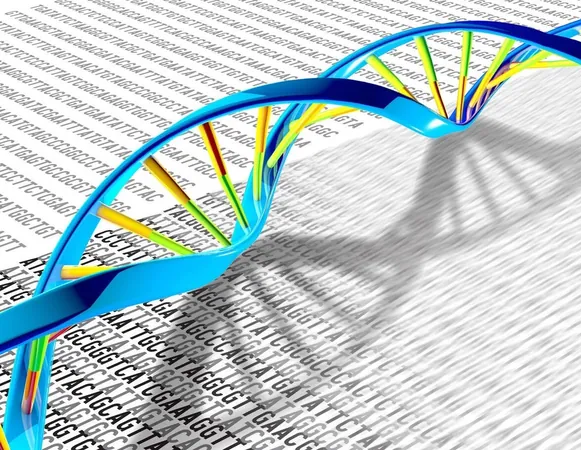
Unlocking the Secrets of DNA: How It Influences Reproductive Health, Fertility, and Lifespan!
2024-12-13
Author: Wei
The Genetic Blueprint for Reproduction
Utilizing the GWAS Catalog, a comprehensive database of Genome Wide Association Studies, researchers meticulously analyzed 159 genetic studies, identifying 37 pivotal genes linked to key reproductive traits. These traits range from the age at first childbirth to the timing of menopause, as well as levels of critical hormones like follicle-stimulating hormone (FSH) and testosterone.
This landmark study highlights the undeniable role of genetics in shaping significant health outcomes and influencing fertility. Among the key players is the FSHB gene, intricately associated with 11 different reproductive outcomes. Its influence extends from initiating menstruation to dictating menopause timing, underlining the profound link between our DNA, reproductive health, and aging.
The Ripple Effects: Reproductive Genes and Overall Health
The findings hold substantial implications, revealing intriguing connections between reproductive genes and various health factors. The review discusses how certain genetic traits not only impact fertility but are also correlated with health issues like body mass index (BMI), obesity, hormone-sensitive cancers, and even psychiatric conditions. Senior lead author Professor Melinda Mills emphasized the importance of understanding these genetic factors, especially as societal trends see individuals opting to have children later in life.
“Our study synthesizes existing research to reveal common genes across various reproductive traits, offering insights that transcend fertility to include broader health implications,” remarked Dr. Stefanía Benónínsdóttir, the first author of the study.
The Longevity Connection
Delving deeper, the review explored the bond between reproductive genes and longevity. For instance, the ESR1 gene, linked to various reproductive outcomes, is also associated with an increased risk of hormone-sensitive cancers like breast cancer, which may paradoxically coincide with a longer life expectancy. Simultaneously, the FTO gene, known for its correlations with obesity, BMI, and type 2 diabetes, has been found to influence numerous reproductive traits.
Understanding these genetic connections is becoming increasingly vital as more people choose to delay parenthood, intertwining the fields of reproductive health and aging in unprecedented ways.
Male Fertility: A Missing Piece Revealed
While research historically favored female reproductive health, this review breaks new ground by addressing male fertility genetics. The DNAH2 gene, crucial for testosterone levels and sperm functionality, has emerged as a significant player in male reproductive health. Co-author Vincent Straub highlighted the critical need for more research in this area, suggesting that enhanced understanding of male infertility could lead to novel treatments for couples facing reproductive challenges.
Generational Genetics: Impact on the Future
The study also explores how genetic alterations accumulate over generations. As parents age, they acquire de novo mutations—spontaneous genetic changes that can be passed down to their offspring. Such mutations can profoundly affect the health and development of future generations, an impact previously highlighted by senior co-author Professor Augustine Kong.
This comprehensive review not only illuminates the intricate tapestry of how our genes influence reproductive health, fertility, and longevity but also lays the groundwork for more personalized healthcare approaches. As we unlock these genetic secrets, we can hope for improved outcomes in reproductive health for individuals and families across generations.
Conclusion
In conclusion, the intersection of genetics and reproduction opens up exciting possibilities for advancing healthcare, understanding infertility, and reshaping our approach to reproductive aging as we step into the future. Stay tuned for more groundbreaking insights on how DNA may just hold the key to a healthier, longer life!



 Brasil (PT)
Brasil (PT)
 Canada (EN)
Canada (EN)
 Chile (ES)
Chile (ES)
 España (ES)
España (ES)
 France (FR)
France (FR)
 Hong Kong (EN)
Hong Kong (EN)
 Italia (IT)
Italia (IT)
 日本 (JA)
日本 (JA)
 Magyarország (HU)
Magyarország (HU)
 Norge (NO)
Norge (NO)
 Polska (PL)
Polska (PL)
 Schweiz (DE)
Schweiz (DE)
 Singapore (EN)
Singapore (EN)
 Sverige (SV)
Sverige (SV)
 Suomi (FI)
Suomi (FI)
 Türkiye (TR)
Türkiye (TR)